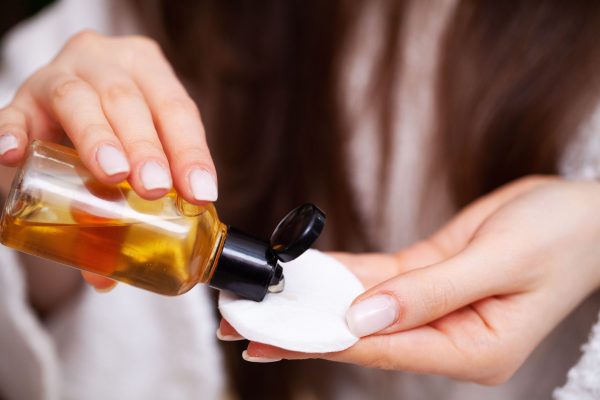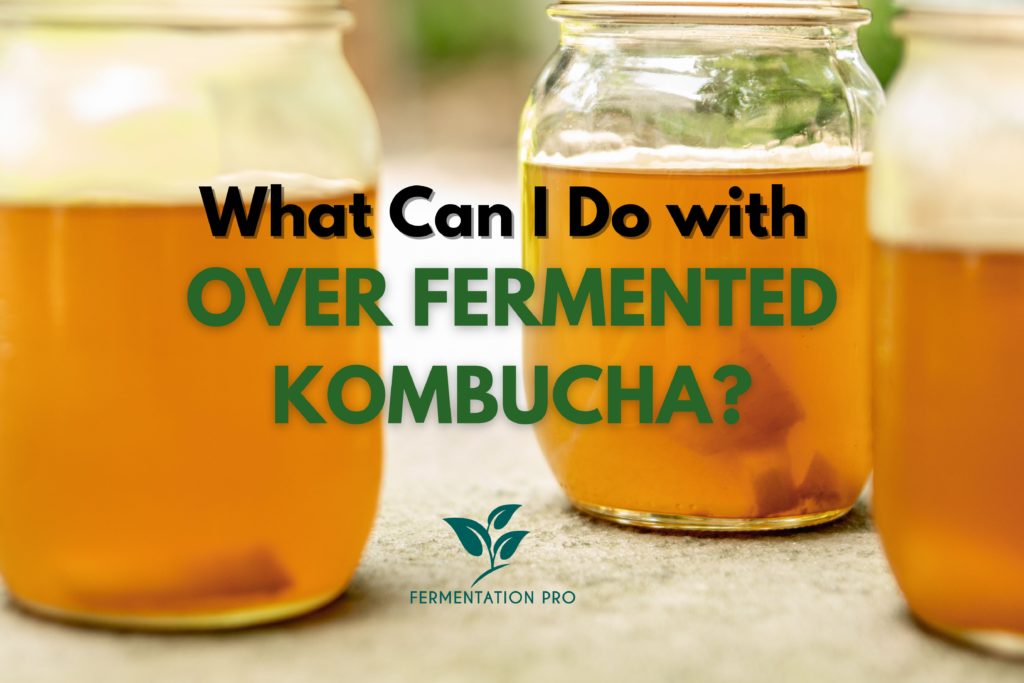Over Fermenting Kombucha is just one of the common mistakes that many homebrewers experience at some point of their brewing journey. Although over-fermented Kombucha is literally the opposite of the expected result of brewing Kombucha, there are still a number of ways to use this accidental creation.
Today, we will be going in-depth to the different ways to use over fermented Kombucha as well as detailed instructions on how to do them. Without further adieu, let’s jump into it!
Table of Contents
How Does Kombucha Become Over Fermented?
During the first fermentation, The starter tea and SCOBY transform the sweet tea into Kombucha. This is the most crucial part of Kombucha brewing because it is the time when your actual Kombucha forms. Usually, this fermentation process can take between 7 to 21 days depending on several factors like:
- Temperature
- pH level
- Amount of oxygen in the brew
- CO2 dissolved in Kombucha
- Composition of the medium
Because of these varying factors, it is fairly difficult to track the fermentation process of Kombucha. Not being able to track the fermentation process often leads to overfermentation.
Over fermentation occurs when you leave your culture to ferment longer than recommended or needed. For instance, your Kombucha could have completed its fermentation after day 15, however you accidentally left it to ferment for 20 days and more. The longer you ferment Kombucha, the more acidic and tart it becomes. Because of the high acidity and vinegar-like tart flavor of over fermented Kombucha, it is often referred to as Kombucha vinegar.
Over fermented Kombucha can have a strong and acidic taste that could be very unappealing for regular consumption. Although you can opt to add sweeteners to make it more palatable, its taste can still be overwhelming especially for newbie drinkers.
Moreover, over fermented Kombucha may not be suitable for regular consumption for some people. Although it’s generally safe to drink over fermented Kombucha, consuming this in high amounts regularly can cause adverse side effects particularly to the teeth because of its high acidity.
But don’t throw your over fermented Kombucha or Kombucha vinegar just yet. As we have mentioned above, there are still beneficial ways to use this. Keep reading to know more!
How to Make Kombucha Vinegar

Making Kombucha vinegar is the easiest and most foolproof way of repurposing over fermented Kombucha. To make your Kombucha Vinegar, you just basically need to ferment your Kombucha for a longer time. The fermentation time for Kombucha vinegar should be at least 30 to 60 days. If you are brewing in a cold area, the fermentation process can take longer. You will know if your Kombucha vinegar is ready when it develops that extremely acidic and sharp vinegar taste.
But how can Kombucha turn into vinegar anyway? Well, there’s some science involved in that. The yeast in your brew produces alcohol during the fermentation process. This alcohol is later consumed by the bacteria converting it to acetic acid. The longer time you ferment your brew, the more acetic acid is produced. The high concentration of acetic acid makes the Kombucha vinegar acidic.
Acetic acid doesn’t just increase the acidity of Kombucha vinegar. It also has the ability to fight off bacteria that can adversely affect your finished vinegar. It is also responsible for giving vinegar its strong smell.
The acetic acid content of Kombucha vinegar varies depending of several factors like:
- Fermentation time
- Sugar amount
- Amount of culture used
Nevertheless, Kombucha vinegar contains acetic acid concentration that ranges from 2% to 3%. While this acetic acid concentration is not as high as apple cider vinegar or white vinegar that have 5% and 4% to 5% acetic acid respectively, Kombucha vinegar is still beneficial and useful.
Just like any type of vinegar, Kombucha vinegar still contains acetic acid that can help the body in many ways. An evidence-based article on acetic acid further states that this substance has the ability to:
- Lower blood pressure
- Promote blood sugar control
- Reduce inflammation
- Support weight loss
- Fight off bacteria
Uses for Kombucha Vinegar
You will be surprised by how versatile and easy to use Kombucha vinegar is. Usually, you can use Kombucha vinegar just like how you use other types of vinegar. Below we’ve listed the best uses for Kombucha vinegar.
Add Kombucha vinegar to your food

Kombucha vinegar contains health-promoting acetic acid. By ingesting acetic acid from Kombucha vinegar, you can optimize its health benefits. Kombucha vinegar also has that sharp sour vinegar taste that enhances the flavors of different dishes. Kombucha vinegar will not just make you healthy but also make your food taste better.
Do not be afraid to experiment and add Kombucha vinegar to your food. Here are some suggestions that can help you out.
- Salad dressing
Vinegar-based dressings are great for leveling up the taste of your boring salad. In addition, acetic acid helps the body absorb minerals from your leafy green more effectively and boost calcium absorption of the body. Kombucha vinegar on salads can also help reduce hyperglycemia or high blood glucose that is typically triggered by high sugar intake.
Moreover, Kombucha vinegar dressing contains less fat and sodium compared to other creamy salad dressings. It is a healthier option for dressing especially for those who are trying to lose weight.
To use Kombucha vinegar for salad dressing, add this ingredient to your favorite salad dressings like olive oil, honey, dijon mustard, and more.
- Meat marinade
Using Kombucha vinegar as a meat marinade can help soften the meat’s surface allowing the marinade to break into it. This results in a more flavorful and tasty marinated meat dish that you will surely love.
To do this, simply make your meat marinade as you usually do then add the Kombucha vinegar. You can add as much Kombucha vinegar to your meat marinade as you prefer.
Make Kombucha probiotics water
Probiotics water is a type of drink that contains helpful probiotics that nurture the gut. It is also beneficial for fighting infections and losing weight.
Making probiotics water is relatively easy and the ingredients are widely available. Simply have to mix 1 tbsp. of Kombucha vinegar with 1 cup of water or more depending on your preference. You can add ginger, lemon, and some sweetener for more flavors. Serve this drink with ice for a more refreshing taste.
Clean your house with Kombucha vinegar cleaner
It is always a good idea to use non-toxic cleaning products to clean the house especially if you have children and pets around. Some of the best non-toxic cleaning products you can use are hydrogen peroxide, baking soda, and vinegar including Kombucha vinegar.

Like regular vinegar, Kombucha vinegar can help disinfect surfaces and fight off bacteria growth. Additionally, it can clean stubborn grease and grime as well as help remove foul odor.
Despite being less acidic than other types of vinegar, Kombucha vinegar is still not advisable to use on sensitive stone surfaces like granite and marble, and wood furniture. The acidity of Kombucha vinegar may stain and ruin the surfaces of these materials.
You can use Kombucha vinegar cleaner to clean the following:
- Kitchen sinks
- Floors
- Stovetops
- Stainless cookwares
- Coffee maker, microwave, dishwasher, and other appliances
- Cloudy glasses
To use Kombucha vinegar as a household cleaner, simply transfer your Kombucha vinegar on a spray bottle. Spray your Kombucha vinegar to the spot you want to clean and wipe it with a towel.
You may also add additional cleaning ingredients to your Kombucha vinegar cleaner like lemon, orange, grapefruit, and other citrus fruits to take away that strong vinegar smell.
Incorporate Kombucha vinegar in your skincare
We know that sounds unbelievable but it’s true! You can use Kombucha vinegar on your skin. Let’s explain how.
Kombucha vinegar can be applied on the skin as a facial toner. This substance has strong antimicrobial and antioxidant properties from its acetic acid content.

These properties can help prevent and heal acne or other bacterial and fungal infections. Additionally, acetic acid is an astringent agent so it can help with cleaning the skin and tightening the pores.
To use Kombucha as a face toner, simply dip a cotton in Kombucha vinegar and apply directly on the skin. However, if you have extra dry and sensitive skin, you can opt to dilute Kombucha vinegar in water with a 50:50 ratio.
However, short fermented Kombucha may not contain the same health benefits as Kombucha brewed for a longer time.
Nourish your hair with Kombucha vinegar
The acetic acid in Kombucha vinegar makes it great to use as a natural hair rinse. A hair rinse is a kind of treatment that improves your hair health. It can nourish, moisturize, and cleanse your hair effectively. Using Kombucha vinegar hair rinse can help lessen scalp itching or dryness, reduce breakage, clean build-ups, and condition your hair.
Making your Kombucha hair rinse is not complicated at all. First of all, you will need to dilute the Kombucha vinegar with water. Combine 1 to 2 tablespoons of Kombucha vinegar with 4 tablespoons of water. Feel free to change this recipe based on your liking and your hair’s reaction to the hair rinse.
After making the hair rinse, transfer the mixture to a spray bottle and spray directly to your hair after washing it. You may also opt to apply the hair rinse using your hands. Next, leave the hair rinse on your hair for 1 to 2 minutes then rinse with water. Use this on your hair one to two times a month for maximum results.
Kickstart your next batch with Kombucha vinegar
To start your new Kombucha batch, you will need sweet tea, SCOBY, and Kombucha tea starter. A tea starter is basically Kombucha that has already completed fermentation. It contains living bacteria and yeast necessary for fermentation.
Kombucha vinegar makes a good tea starter because it is already acidic and can help increase the acidity of your brew. The high acidity can inhibit the growth of harmful bacteria. Additionally, it can effectively help kick start the fermentation process of your new batch of Kombucha.








